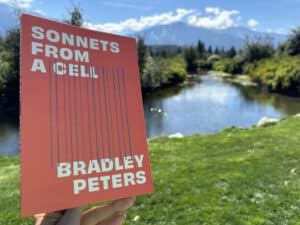Book review: Sonnets mirror the rigidity of the cell in collection of poems

Bradley Peters did though—wending his way in and out of Canadian prisons as a young man—and he had the talent and focus to turn that horror into art and a damning indictment of the system.
His chosen poetry form—the sonnet—mirrors the rigidity of the cell, capturing the containment and lack of autonomy that bears down upon a prisoner behind locked doors. Yet with that structure, Peters finds a way to soar and be free, suggesting how he might have used imagination and art as a prisoner to stay liberated during his time in the cells.
This is not light reading. Some lines rip upon the stomach, others tear at the heart. Some require a moment, a breath, a pondering to digest.
A Visit to the Box (the box is slang for solitary confinement)
‘…the room
Make me feral, cry fam, skip chow, crave blood. I pace
And pace. I need to try and love myself
but the room won’t allow it. It dilates
Into one rage box. The room moves through me.
I stretch each fibrous limb. I bare white teeth.
My skin shines. I am clean and out to kill.’
One of Peters’ strengths is his ability to play polarities, invoking both a sense of confinement and freedom, or tenderness and toughness, or illuminating while obscuring. He also damns by showing and revealing, rather than asserting or telling.
Whilst not pleasant to peruse, the poems are magnetic and beg for repeated reading to penetrate the layers. There is a glossary at the back, and it’s worth reading that before reading the poems because some words hold double-meanings, and others are not what you think. This changes the implications of the lines.
Fun and Games
‘… a guy walks into a cell with laced shoes-
One guard says drama. One guard just smiles and nods-
Then walks out shirtless with two balloon hands…’
This makes more sense if you know that ‘laced shoes’ signals that the prisoner is ready to fight, and drama means a fight or assault. Now we know that one guard read the signs, and one didn’t, and that guard was assaulted.
The brilliance of Sonnets from a Cell is reflected in the awards it’s collected—it won both the 2024 Raymond Souster Award and the 2023 Alcuin Award, and was longlisted for the 2024 Gerald Lampert Award.
The jurors of the Raymond Souster award said that ‘These technically refined poems upend notions of who is “free” and who is “protected” by providing a nuanced, emotional framework for why the abolition of prison systems is so urgent.’
Through having the courage to share from the depths of his experience, Peters has revealed the inhumane nature of our prison systems in a way that penetrates the soul. By the end I felt like I’d lived an hour or two in the cell alongside Peters, and found myself experiencing waves of gratitude that this has not happened to me.
Perhaps it should be required reading for all politicians, or at the very least, those holding any responsibility for the criminal justice system.
Bradley Peters is a poet, actor, and carpenter from Mission, BC. His poetry has been published in numerous literary magazines, has been shortlisted for The Fiddlehead‘s Ralph Gustafson Award, has twice been the runner-up for Subterrain‘s Lush Triumphant Award, and in 2019 placed first in Grain Magazine‘s Short Grain contest. Sonnets from a Cell is his first book.
Peters appears in The Sound of Story: Oral Storytelling & Spoken Word on Oct. 17 at the Whistler Public Library. Tickets are on sale now.
Review by Kara-Leah Grant. Grant is a voracious reader and writer who delights in the power of words and thrills to see other writers trust in and fulfill their dreams. Find her books on Amazon.
